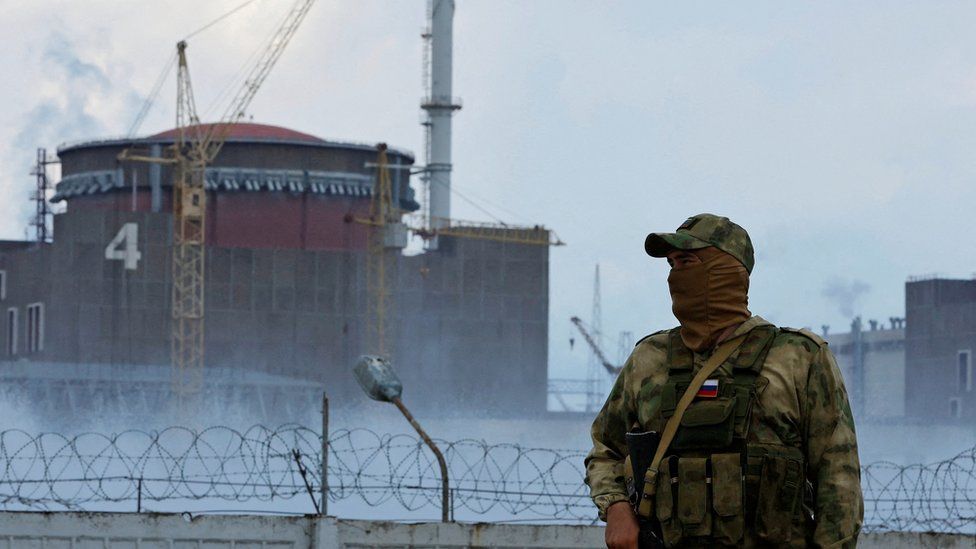Zaporizhzhia nuclear workers: We're kept at gunpoint by Russians
- Published

Staff at the occupied Zaporizhzhia nuclear power plant have described to the BBC being kept at gunpoint while Russian troops use it as a military base.
Invading forces have occupied the site, the biggest nuclear plant in Europe, since early March. However, it's still operated by Ukrainian technicians.
Moscow has recently been accused of using the plant "as a shield" while its troops launch rockets from there towards nearby locations.
And on Thursday, more shelling was reported - and the head of the UN issued a new warning about fighting near the nuclear site "leading to disaster".
Now two workers have told the BBC about the daily threat of kidnap, as well as their fears of either "radioactive contamination of the wider region" or a nuclear catastrophe.
In the southern city of Nikopol is one of the most dangerous vantage points in Ukraine.
On the banks of the Dnipro River, it's possible to see the Zaporizhzhia nuclear power plant 10 miles across the water.
It's a place which has seen heavy shelling over the past couple of weeks, with up to 120 rockets being reported in a single night.
They come from the direction of Enerhodar, the city where the plant is situated.
In turn, Enerhodar - and the power station - have also come under heavy fire.
The UN's nuclear watchdog claims there's a "real risk of nuclear disaster" unless the fighting stops and inspectors are allowed access.
Ukraine and Russia blame each other. The picture is murky, but the risks are crystal clear.
Watch: Zaporizhzhia nuclear plant appears on fire after shelling (3 March 22)
"My working day is a constant stress," says Svitlana, who's contacting us over text.
She and fellow worker Mykola can only use Russian Sim cards now and signal is very limited. We're not using their real names for their safety.
"I can't work like I used to," says Svitlana. "The last week I haven't even been able to come to my workplace - it's dangerous.
"On Saturday, there was shelling of the nitrogen-oxygen station, which caused a fire. By some miracle, the people working there survived."
Another Enerhodar resident tells us that shop and pharmacy prices are now four times higher than in territory that Ukraine still controls, as well as there being a shortage of doctors. Most ATMs are closed, too.
Svitlana has worked at the plant for many years, and says shells have been landing close to it every day.
"The psychological situation is difficult," she adds. "Soldiers are walking everywhere with weapons and everyone is actually kept at gunpoint."
Russia is accused of basing about 500 soldiers there. Recent footage has showed military vehicles being driven inside, and Svitlana is in no doubt it's being used as a base.
"Every day they drive back and forth in their military vehicles," she says.
"They positioned their military equipment right at the station buildings, to make it impossible for Ukrainian armed forces to strike."
A text comes in from Mykola: "The staff are now hostages of the Russians," it reads.
"They turned off the internet, left only landline phones, and food is available only in one single dining room. They turned the others into their bases."
Ukraine is concerned Russia has started shelling the area it occupies to try to create a false narrative, such as: "Ukraine is attacking you - so better vote to join Russia so we can take root and protect you."
Moscow-installed politicians for the Zaporizhzhia region have just signed an order for a referendum to be held soon. Russia has staged sham votes in the past, such as with Crimea, which it annexed in 2014.
Mykola continues: "Access to all roofs is prohibited, they made their observation points there. The training building also became their barracks.
"Now, more and more often, staff are kidnapped just when leaving the shift at the security gate."
It's not known why the kidnapping takes place - but residents paint a picture of intimidation as Russians look to lay down down law.
Svitlana and Mykola also describe rubbish being left everywhere by the Russians - but they say staff are still able to monitor the reactor properly.
Zaporizhzhia: How the crisis unfolded
- March 2022: Shortly after the start of their invasion of Ukraine, Russian troops seize the plant. Its management is told it now belongs to Russian state nuclear power company Rosatom. Ukrainian staff continue to operate the plant under Russian control
- July: Russian forces reportedly deploy rocket launchers in the complex, turning it into a military base
- 3 August: The International Atomic Energy Agency says the plant is "completely out of control" and needs an inspection and repairs
- 5 August: Ukraine's nuclear agency, Enerhoatom, says two rounds of Russian rocket fire prompted its operators to disconnect a reactor from the power grid
- 8 August: Ukraine says renewed Russian shelling has damaged three radiation sensors and injured a worker. Local Russian-backed authorities say Ukrainian forces hit the site with multiple rocket launchers
- 10 August: Foreign ministers from the G7 group of nations say Russia must immediately hand back control of the plant to Ukraine
- 11 August: More shelling of the plant is reported, with Ukraine and Russia again blaming each other
Hryhoriy Plachkov, former head of the State Nuclear Regulatory Inspectorate of Ukraine, tells us the risks are "great" as long as the Russians controls the Zaporizhzhia power plant.
He admits it would take "two to three" months for the Russians to re-direct power back to their own grid, if that was their goal.
Enerhodar is part of a southern front line which has seen more intense fighting in recent weeks.
There is, however, still very little movement - suggesting Europe's biggest nuclear power station will continue to slip from Ukraine's control.
Additional reporting by Daria Sipigina and Hanna Chornous.
Related Topics
- Published12 August 2022
- Published10 August 2022